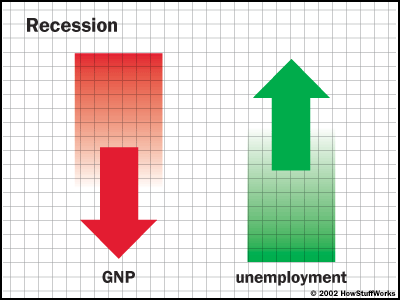The next U.S. recession will start in earnest on October 17. (If it hasn’t already.)
That’s the day the new bankruptcy law kicks-in, and credit card banks get hit by a double-whammy of their own creation. (Illustration is from Howstuffworks.) Be careful of what you ask for, because you just might get it:
- Borrowers must begain paying back credit card loans based on a 10-year payback, doubling many minimum balances, and
- New rules force borrowers to repay those debts, even after filing bankruptcy.
How can this be bad for banks, who after all pushed for the legislation?

Faster write-downs of credits by borrowers means fewer assets for credit card banks. Forcing borrowers to pay back their loans, even after bankruptcy, means those assets can’t be written-off, and those bankrupt borrowers can’t be extended new credit. It’s a squeeze on bank assets, from both sides of the ledger.
So two things happen, even in the best of all possible worlds. Assets decline, while new assets become harder to generate.
Could this have been prevented? Yes. A slow phase-in of the new rules, and a major publicity campaign about them starting, say, last January, could have given us a “soft landing.” But it’s really too late for that now.
And this is not the best of all possible worlds, is it?
Millions of people (I have no idea how many, but the number may be in the 10s of millions) are already at their limits, squeaking by and paying the minimum on their credit card balances. To protect themselves, the banks made it the law that rates on balances that fall past-due automatically jump to over 30%. But this is, in fact, no protection at all. The banks’ assets are frozen, and while they might be paid back in time, the chances of raising more assets (remember, loans are assets to the banks) declines dramatically once the hammer falls on borrowers.
Now, why are people so heavily extended on credit card loans? Were they stupid? No. It’s mainly because they’re putting all their cash into mortgages. People have been encouraged (by subsidies, and the fact that banks can always sell their loans to Fannie Mae and Freddie Mac) to create a mortgage “asset bubble,” with interest-only and adjustable-rate loans. People were then encouraged to furnish these palaces through credit cards or second-mortgages.
This has happened nationwide, not just in the areas where the supply of new housing has been tight.
So let’s say you’re stretched and October rolls around. The credit card bill jumps. The natural inclination (the one encouraged by banks) is to tap the home equity. But that may already be tapped. With many tapped people forced to put homes on the market (to stave off bankruptcy) a downward spiral begins. Home equity values fall, and with each turn more over-extended homeowners find themselves with negative equity. Home equity loans must be called, mortgage loans start to default, foreclosures add more assets to the pile. (Those who deal in foreclosures are already cheering.)
What happens to the economy? Bank assets are declining, home assets are declining, what do you think happens? (Already, businesses are being encouraged to declare bankruptcy now, and not wait for the new law to hit them as well.)
It may not be a full-blown recession. It may be, in Herbert Hoover’s memorable words, merely a slight depression.
How bad does it get? What do you think I am, a prophet?
My advice is to get in the best equity position you can before the hammer falls. Look for stocks in companies that export. Look for hard assets, foreign assets. The natural inclination in this situation will be for the government to print more dollars, but the government too is overextended, thanks to Iraq, pork and tax cuts, so when more dollars are printed the value of each dollar falls. Thus, you don’t want to be in dollars.
Even with the economy continuing to grow, the current government is unpopular. What do you think happens after October?
If there’s a market in them, I’d be shorting Republican futures myself. The popping of economic bubbles is usually followed by the popping of political ones. (But I don’t think there’s a market in Republican futures.)
Get into cash, into hard assets, into foreign currencies. You have two months. If I’m wrong you can always re-adjust the portfolio next year.

And look at the bright side. Few knew, execpt in retrospect, that AOL’s takeover of Time-Warner in 2000 meant the end of the Internet bubble. Few knew, in 1987, that the Nikkei’s fall from 37,000 would be permanent.
You know. In advance. You have the date and the reasons. Congress gave you warning.
If you don’t act, don’t blame me later.
